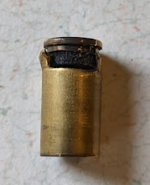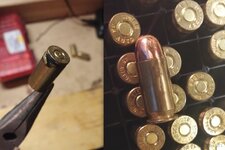Silver Lifetime
- Messages
- 42,616
- Reactions
- 110,634

IIRC, one of my first posts to this forum was regarding this very problem; some MiWall reloads I had bought at a gun show had one round blow out the web in a Glock 19.
The very same thing just happened to me with the same box of ammo - this time with my SIG Mk25.
It slight singed my hand and blew debris into my face. Luckily I was not hurt seriously - just a bit of soreness on my trigger finger knuckle and some debris in my eye - I should have been wearing eye protection but I could not find it inside the house - I should have known better!
I had thought the previous was a once in a big number failure. Now not so much. What is the chance of this happening twice with the same 50 round box. I had set the box aside because I didn't want anyone else to be injured, but I didn't think it would happen again.
The report was louder than usual, but that might have been caused by the brass blowing out the side.
Either the ammo was loaded too hot and/or they used brass that had been reloaded one too many times (possibly hot before). This is why I don't use brass I do not know the history of and why commercial reloaders should not either. I suspect MiWall just picked up range brass. It is also possible, that since I bought this at a gun show and I do not recall if it was MiWall selling the ammo or just some private party, that it was someone else who reloaded it and put it into a MiWall box he had laying around. I did buy multiple boxes of this ammo though - all with MiWall markings - it says "RELOADS" on the end flap and MiWall still reloads 9mm ammo.
Either way, I am going to try to find my bullet puller, pull the bullets and destroy the cases. Maybe weight the powder charges too.












